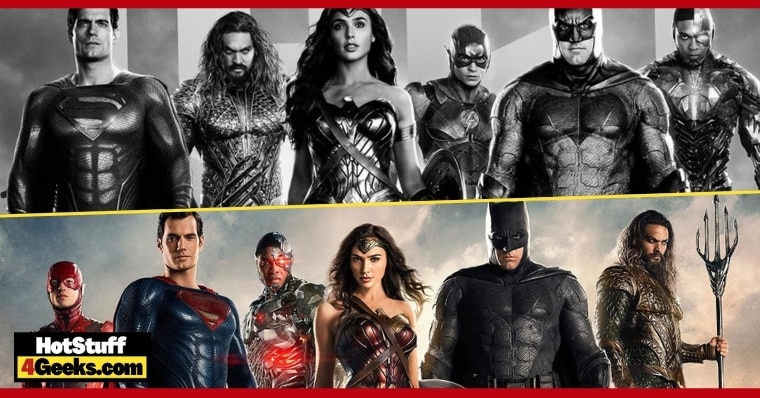The
Justice League movie has been controversial since its release and going through a seemingly turbulent recording process. The production, which Zack Snyder initially directed, passed into Joss Whedon's hands when the former director stepped away from the project due to sensitive personal issues. After the theatrical release,
Snyder commented over the years on how far the film had strayed from his vision. As time went on, the movement that arose in favor of releasing his version gained momentum and was finally heard by Warner. Positively or negatively, everyone wondered what the main divergences between the two versions would be, whether to question the need for the film to exist or out of curiosity to see the production the way Snyder would have wanted to create it. Last Thursday, this was finally possible. The much anticipated
Snyder Cut was released and reached the world via digital platforms. But what are the main differences between the two? What has been added or cut from
Snyder's film? You can check out the complete list with the answer to these questions here!
The Visuals
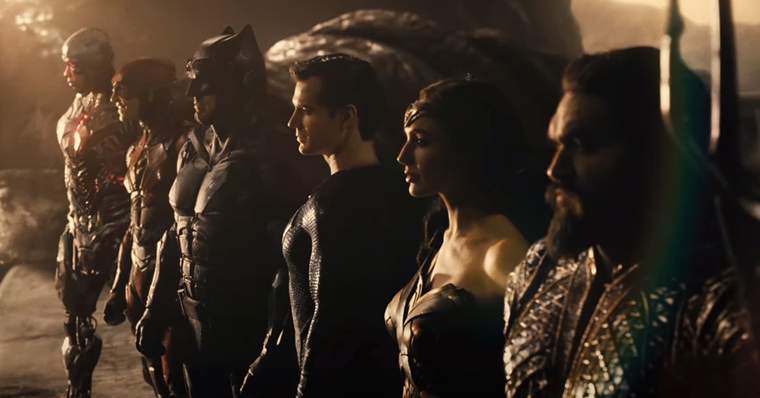
One of the already known elements to be changed was the screen ratio used in
Snyder's version. The director opted for a more square format, with a 4:3 aspect ratio, because he chose to shoot the film on cameras with a 1.33:1 aspect ratio. The film that reached theaters used the standard widescreen 16:9 aspect ratio. Besides the format, another notable difference from the beginning is the color palette adopted by each director. Comparing the two films side by side, the differences are obvious, but even without the comparison, the change is quite noticeable to anyone who has seen both movies.
The Soundtrack
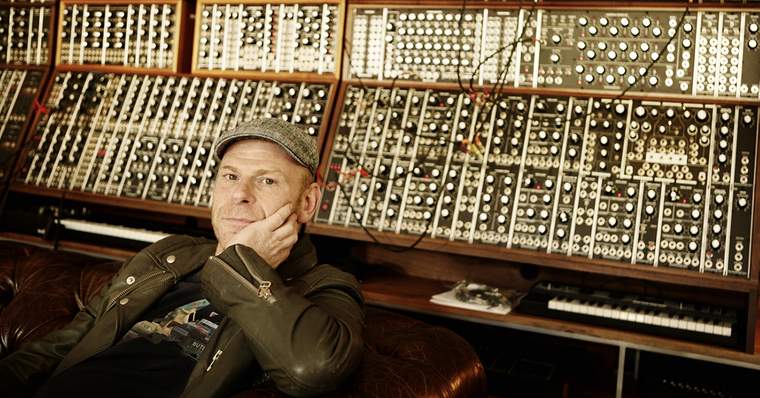
The difference in the entire soundtrack from one film to the other is remarkable, and not by chance: the person responsible for it is not the same in both productions. Explaining better, who would have been in charge of the soundtrack initially would be
Tom Holkenborg, but with
Snyder's departure from the project, he was replaced by
Danny Elfman. Now that the director has had the opportunity to remake the film as he wished, he has brought
Holkenborg back. The differences in the soundtrack are evident throughout the movie. The new soundtrack, which
Holkenborg calls "Mount Everest," is the most extended soundtrack ever released - and no wonder, since the film is 4 hours long, a far cry from the standard found in cinema.
Steppenwolf
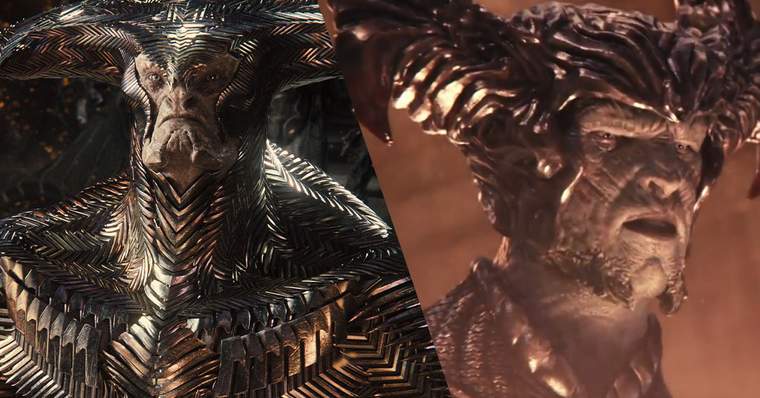
The first noticeable change about the character is his look. Not only the armor of the
Steppenwolf went through changes, but his face itself was also modified, as it's possible to notice in the picture above. The look is far from being the only change that
Snyder's film presents concerning
Darkseid's general. In addition to scenes with the character previously seen being more prolonged, as is the case with his battle against the Amazons, others have been removed, which happened when the first invasion of Earth is shown. While in the cinemas, the invader against whom the different peoples united was the
Steppenwolf, in the new film, it is
Darkseid himself who is shown as this ancient threat.
Darkseid's presence also influences the villain's arc as a whole, since he is not offered as the great enemy, but only as a herald of what is to come, despite all his power. It is also noticeable that the character's motivations were better developed in
Snyder's version, making it clear that conquering Earth is part of the punishment
Steppenwolf received for trying to betray his leader. Finally, the villain's death occurs differently in both versions. In the one that reached the movie theaters, he is killed by the Parademons, while in the new one, who kills him are the heroes themselves.
Cyborg
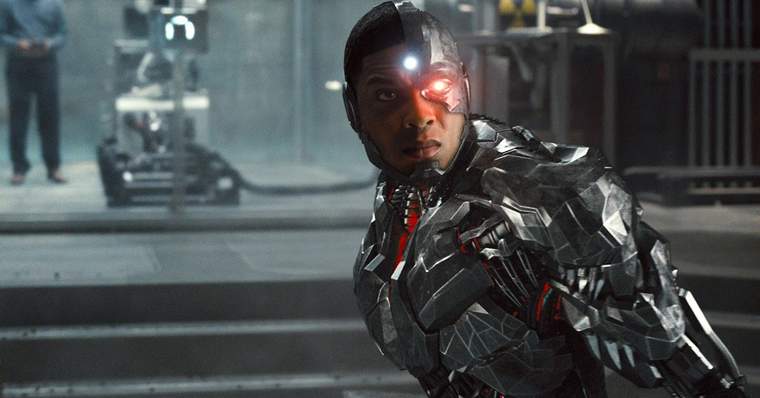
One of the characters that benefit most from the changes presented in
Zack Snyder's Justice League is
Cyborg, who stars in some new scenes that did not make it to theaters. Among them, those that show more of the character's origins stand out.
Snyder's version features a few moments of
Victor Stone as a student before he was in a car accident with his mother.
Victor's tragedy and transformation into
Cyborg are also given more development than Whedon's version. Nearer to the end of the film, when separating the Mother Boxes, a new scene focuses on the character, which shows him before becoming the
Cyborg. He is standing next to his parents, and the three of them seem happy. However, the vision offers
Victor the chance to be fixed, which he refuses, denying anything to be fixed. Thus, the new film builds an arc in which
Victor accepts himself completely, regardless of how he has been changed.
The Flash
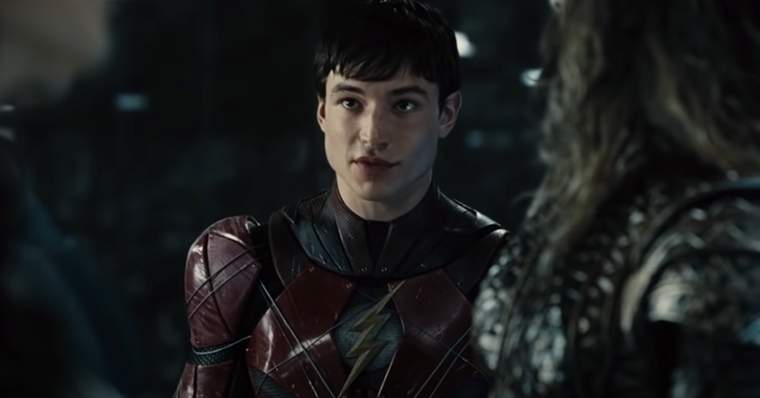 Victor Stone
Victor Stone is not the only one who got more screen time and completely new scenes in
Snyder's version.
Barry Allen appears in a section where he witnesses an accident while trying to get a job. Using his powers, he saves a woman from certain death. Although her name is not mentioned, who is seen in the scene is
Iris West, the character's romantic interest in the comics. Snyder had cast actress Kiersey Clemons, but the scene in which she appears was cut from the film that reached theaters. Another scene added in the new version occurs during the final battle of the group of heroes against
Steppenwolf, as
Cyborg tries to separate the Mother Boxes. At this point,
Flash should use his speed to produce the energy his teammate needed to complete the goal, but the speedster is unable to do so in time. The result is a scene in which
Flash manages to turn back time, and only then helps
Cyborg as planned. But not all the changes were expansions: some scenes of the hero seen in the 2017 film are not in
Snyder's version.
Flash doesn't have to save civilians this time, and his speed competition against
Superman doesn't happen either.
Aquaman
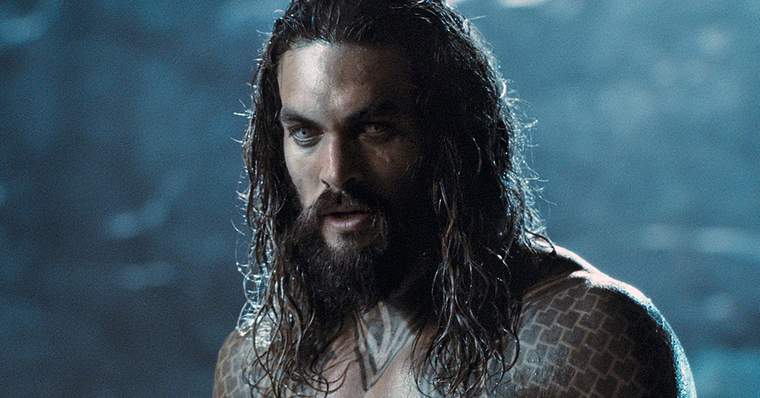 Aquaman
Aquaman's introduction in the two films is similar, although it is longer in
Zack Snyder's Justice League. Regarding scenes that are in only one of the film versions, two are notable: the moment when
Vulko approaches Arthur in an attempt to get
Aquaman to assume the throne of his kingdom, present in
Snyder's version; and the somewhat funny moment when
Aquaman touches
Wonder Woman's Lasso of Truth, found only in
Whedon's version. Finally, when
Cyborg sees the future, it is possible to see
Aquaman dead - something referenced in
Batman's nightmare.
Wonder Woman
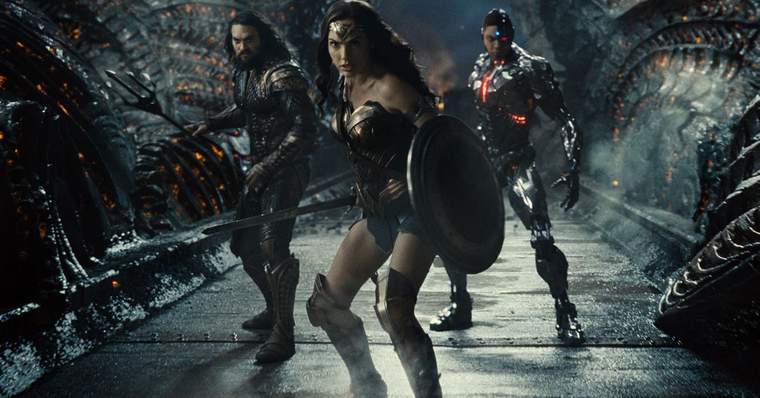
The first change in
Snyder's version of
Diana comes in her introduction. Not only is the scene longer, but it features a more intense action scene in which it becomes clear that the heroine has killed the terrorist who was threatening civilians in a bank. In addition to the scene mentioned above, there is a
Cyborg vision of what appears to be the future, where we see
Wonder Woman dead. Another added set takes place in a moment where the character meets
Alfred. The most notable new scene focusing on
Diana is the one that shows her exploring the ruins that tell the story of
Darkseid and the Mother Boxes. In existing scenes in both versions, some things have been changed. During the fight against the
Steppenwolf,
Diana fights alone in
Whedon's version until
Superman arrives. In
Snyder's film,
Aquaman and
Cyborg are by her side during the fight. And while in the first version, she only destroys the villain's weapon, and who kills him are the Parademons, in the new version,
Wonder Woman is the one who guarantees the death of the
Steppenwolf by cutting off his head. Finally, the characters' motivations are a little different in the two movies.
Diana and
Bruce's decision to bring
Superman back is one thing that changed in this regard. The 2017 production establishes the heroes did not feel adequate in the leadership role and needed
Superman to unite the team. Whereas in the new film,
Batman and
Wonder Woman's motivation is simply that the hero of Krypton is the only one powerful enough to keep the planet safe.
Batman
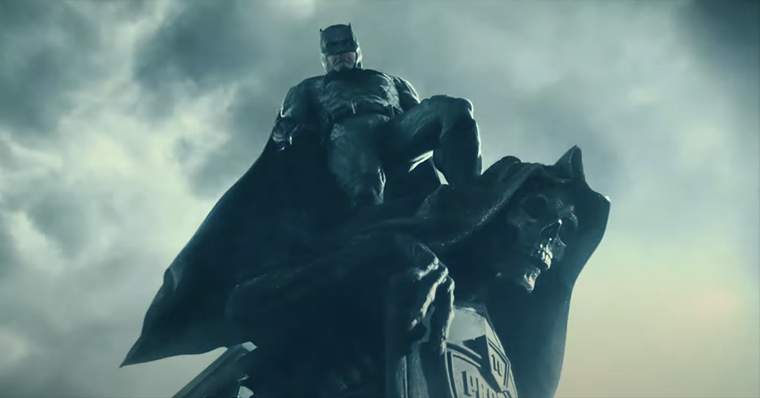
In
Whedon's film, where the capture of a Parademon begins to establish the threats to come and the need for the heroes to unite, it is not present in
Snyder's version. The motivation that leads
Batman to seek out the others is due to
Lex Luthor's warning. Another change occurs with
Superman's return, where the latter attacks Batman more intensely, even going so far as to use his heat vision against him. Also, in
Zack Snyder's Justice League,
Batman made no plan for
Alfred to bring
Lois Lane as a measure to calm
Superman down after his return. Her appearance occurs by chance since she was on the scene because she always visited the hero's statue. There is also the addition of the much-talked-about
Batman nightmare scene (which will be commented on later) and another moment where
Bruce interacts with none other than the
Martian Manhunter. Superman
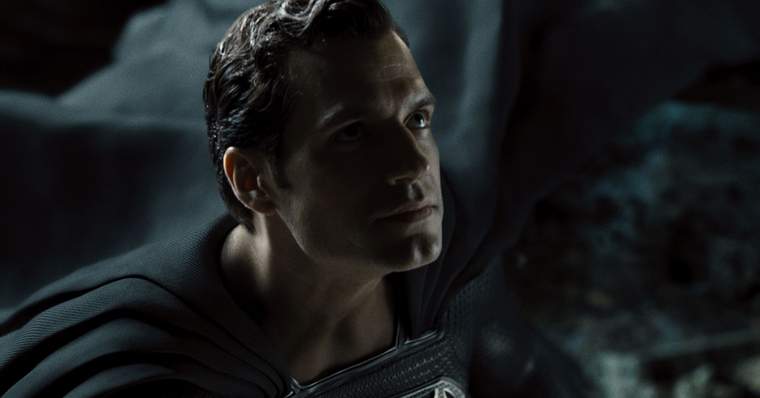
One change that the public received very well regarding
Superman was that the new film does not feature any digitally removed mustache. In practice, this means all scenes of the character added during the reshoots were removed by
Snyder, something noticeable from how the production begins. In
Whedon's film, the first scene of
Justice League shows a cell phone recording of
Superman talking to a child. On the other hand, in
Snyder's version, the scene has been dropped, and what kicks off the film is the scene from
Batman v Superman where the hero dies, edited in slow motion, which shows that his death is what wakes up the Mother Boxes. Other added moments that feature
Superman are
Cyborg's vision and
Bruce's nightmare. Changes have been made to several scenes, such as the hero's return, who is shown to be even more violent in
Snyder's version, where he attacks
Batman with his heat vision. It is also clear that the police officers in the surrounding area are affected by Superman's actions and suffer due to the hero's mental confusion after being brought back from the dead. The dialogue and ending scene of Clark with Lois is also considerably different, although the moment serves the same purpose in both films. The hero's entrance into the battle against the
Steppenwolf is also quite different and, interestingly, somewhat relaxed in
Snyder's film.
Superman says he is not impressed when the villain tries to hit him with his ax. The new film also features
Superman's much anticipated black uniform, which the hero adopts after returning.
Martian Manhunter
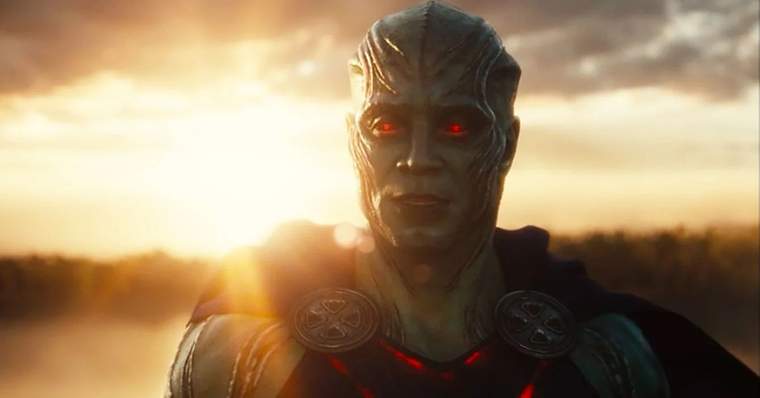
A character who was only included in
Snyder's film, the
Martian Manhunter, has two appearances. The first is in a modified scene in the cinema version, while the second is part of a clip that
Joss Whedon cut.
Martian Manhunter is seen right after a seemingly emotional scene between
Lois Lane and
Martha Kent. However, when Martha leaves the journalist's apartment, it is revealed that that was not
Clark's mother, but rather Martian Manhunter impersonating her. No further explanation, either to introduce the character or to make clear his purpose.
Martian Manhunter's second appearance happens at the end of the movie, after the
Steppenwolf has already been defeated, and even after
Batman's nightmare. He goes after
Bruce, bringing a warning that they must find the Anti-life equation before
Darkseid and introducing himself in a way that suggests him as a future member of the League of Justice.
Silas Stone
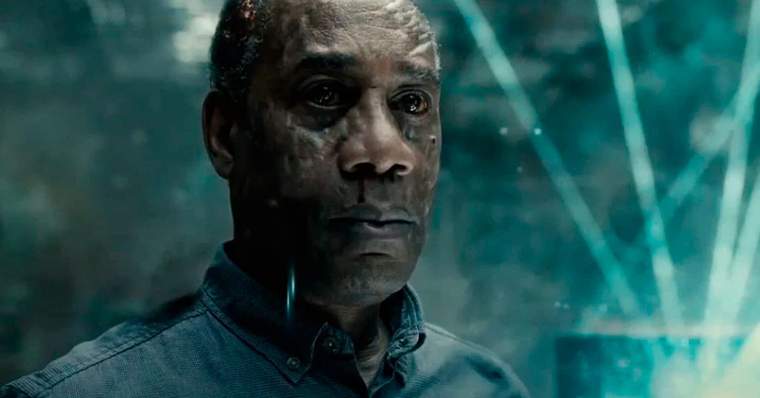
The most notable change regarding
Cyborg's father is quite significant: whereas in
Whedon's film, the scientist survives, in
Snyder's production, he sacrifices himself to make it possible for the heroes to find the Mother Boxes. As a result, we see a bit more of
Cyborg and how his father's death affects him, despite their differences and troubled relationship.
Teamwork
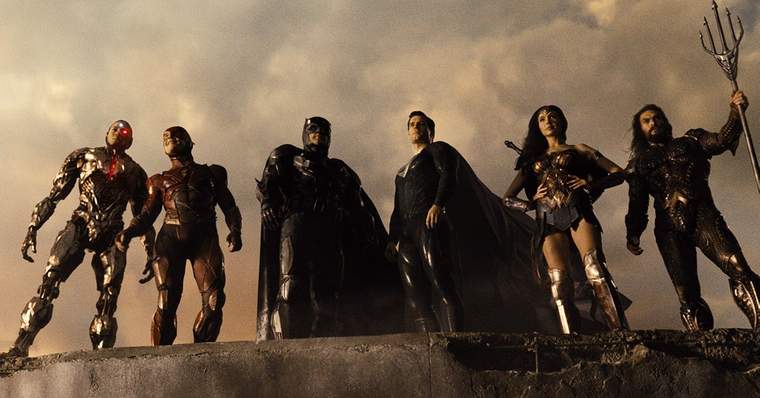
As already mentioned,
Snyder's version features more of the heroes working together when Wonder Woman confronts
Steppenwolf alongside
Aquaman and
Cyborg. Still, other additions show more of the heroes as a group. In the new film, the scenes where the League plans to confront the villain are not in the 2017 production. Another example is that, unlike the
Whedon-directed movie, the new version shows
Aquaman,
Cyborg, and
Flash taking a more active role in the decision to bring Superman back to life.
Darkseid
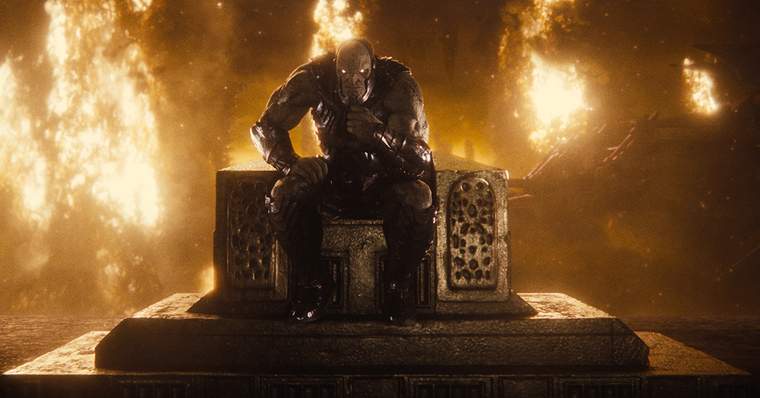
DC's iconic villain doesn't show up in the 2017 film, but he is present in a few Snyder Cut moments. In addition to the scene mentioned earlier where we see the first invasion,
Darkseid appears interacting with
Desaad, who acts as an intermediary between him and
Steppenwolf. Among all the scenes, it's worth mentioning the moment at the end of the movie where, after the Mother Boxes are destroyed, the villain clarifies that he will return, stating that he will conquer the Earth the old-fashioned way.
Deathstroke
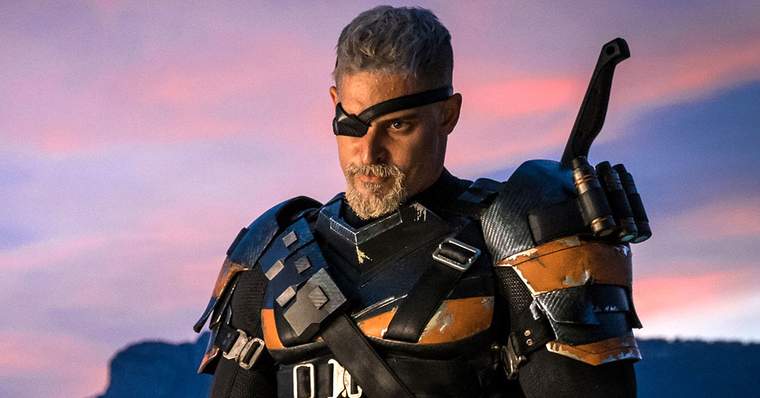
The two characters still interact in
Snyder's film, although this does not happen in a post-credits scene, but rather during the movie. The most noticeable change, however, is in the villains' dialogue. While the 2017 production suggests forming a League of Villains, the new version has no such suggestion, showing only an alliance of interests between
Luthor and
Slade.
Other characters
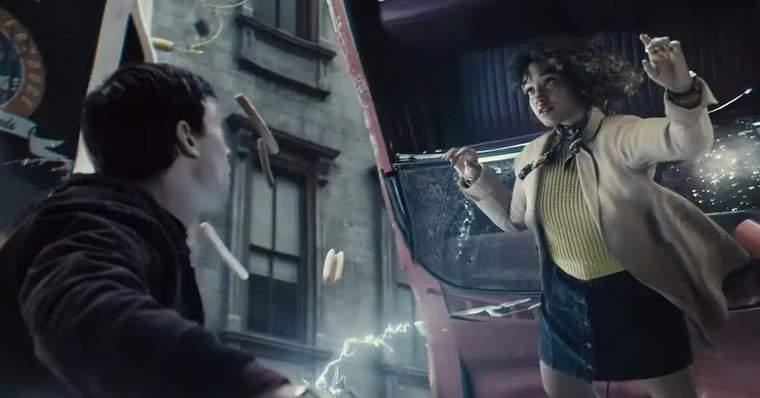 Iris West
Iris West,
Martian Manhunter,
The Joker,
Vulko,
Desaad, and
Darkseid have already been mentioned among the changes. Still, they weren't the only DC characters who were left out of the theaters' version but appeared in the Snyder Cut. In addition to them,
Granny Goodness appears alongside
Darkseid, although she doesn't have a significant role in the plot. Another character cut from
Whedon's version is
Ryan Choi, who has some relevance in
Snyder's production.
Green Lantern Kilowog can also be seen in the new film.
The Nightmare 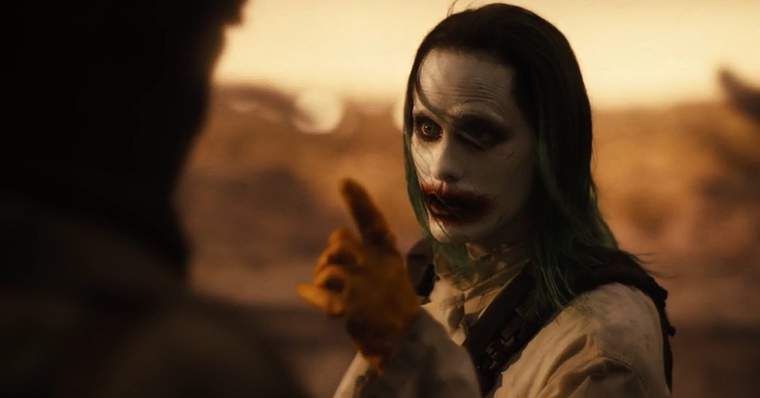
There were few moments for which new footage was needed. The Nightmare resembles a scene from
Batman v Superman where
Bruce sees a dystopian future in which
Superman has gone over to the side of evil. In
Zack Snyder's Justice League, the scene shows the unlikely group formed by
Batman,
Cyborg,
Flash,
Mera,
Deathstroke, and
Joker, trying to survive and fight Darkseid's dominance. In this scene, it is revealed that
Arthur Curry has been killed when
Mera tells that she wants revenge for his death. Also, there is an extended interaction between
Batman and the
Joker, played by
Jared Leto, where it is revealed that
Harley Quinn is also dead. The film version that made it to theaters has none of this and seems to have almost completely discarded
Snyder's idea of this dystopian future that he keeps hinting at in his DC films.
 One of the already known elements to be changed was the screen ratio used in Snyder's version. The director opted for a more square format, with a 4:3 aspect ratio, because he chose to shoot the film on cameras with a 1.33:1 aspect ratio. The film that reached theaters used the standard widescreen 16:9 aspect ratio. Besides the format, another notable difference from the beginning is the color palette adopted by each director. Comparing the two films side by side, the differences are obvious, but even without the comparison, the change is quite noticeable to anyone who has seen both movies.
One of the already known elements to be changed was the screen ratio used in Snyder's version. The director opted for a more square format, with a 4:3 aspect ratio, because he chose to shoot the film on cameras with a 1.33:1 aspect ratio. The film that reached theaters used the standard widescreen 16:9 aspect ratio. Besides the format, another notable difference from the beginning is the color palette adopted by each director. Comparing the two films side by side, the differences are obvious, but even without the comparison, the change is quite noticeable to anyone who has seen both movies.  The difference in the entire soundtrack from one film to the other is remarkable, and not by chance: the person responsible for it is not the same in both productions. Explaining better, who would have been in charge of the soundtrack initially would be Tom Holkenborg, but with Snyder's departure from the project, he was replaced by Danny Elfman. Now that the director has had the opportunity to remake the film as he wished, he has brought Holkenborg back. The differences in the soundtrack are evident throughout the movie. The new soundtrack, which Holkenborg calls "Mount Everest," is the most extended soundtrack ever released - and no wonder, since the film is 4 hours long, a far cry from the standard found in cinema.
The difference in the entire soundtrack from one film to the other is remarkable, and not by chance: the person responsible for it is not the same in both productions. Explaining better, who would have been in charge of the soundtrack initially would be Tom Holkenborg, but with Snyder's departure from the project, he was replaced by Danny Elfman. Now that the director has had the opportunity to remake the film as he wished, he has brought Holkenborg back. The differences in the soundtrack are evident throughout the movie. The new soundtrack, which Holkenborg calls "Mount Everest," is the most extended soundtrack ever released - and no wonder, since the film is 4 hours long, a far cry from the standard found in cinema.  The first noticeable change about the character is his look. Not only the armor of the Steppenwolf went through changes, but his face itself was also modified, as it's possible to notice in the picture above. The look is far from being the only change that Snyder's film presents concerning Darkseid's general. In addition to scenes with the character previously seen being more prolonged, as is the case with his battle against the Amazons, others have been removed, which happened when the first invasion of Earth is shown. While in the cinemas, the invader against whom the different peoples united was the Steppenwolf, in the new film, it is Darkseid himself who is shown as this ancient threat. Darkseid's presence also influences the villain's arc as a whole, since he is not offered as the great enemy, but only as a herald of what is to come, despite all his power. It is also noticeable that the character's motivations were better developed in Snyder's version, making it clear that conquering Earth is part of the punishment Steppenwolf received for trying to betray his leader. Finally, the villain's death occurs differently in both versions. In the one that reached the movie theaters, he is killed by the Parademons, while in the new one, who kills him are the heroes themselves.
The first noticeable change about the character is his look. Not only the armor of the Steppenwolf went through changes, but his face itself was also modified, as it's possible to notice in the picture above. The look is far from being the only change that Snyder's film presents concerning Darkseid's general. In addition to scenes with the character previously seen being more prolonged, as is the case with his battle against the Amazons, others have been removed, which happened when the first invasion of Earth is shown. While in the cinemas, the invader against whom the different peoples united was the Steppenwolf, in the new film, it is Darkseid himself who is shown as this ancient threat. Darkseid's presence also influences the villain's arc as a whole, since he is not offered as the great enemy, but only as a herald of what is to come, despite all his power. It is also noticeable that the character's motivations were better developed in Snyder's version, making it clear that conquering Earth is part of the punishment Steppenwolf received for trying to betray his leader. Finally, the villain's death occurs differently in both versions. In the one that reached the movie theaters, he is killed by the Parademons, while in the new one, who kills him are the heroes themselves.  One of the characters that benefit most from the changes presented in Zack Snyder's Justice League is Cyborg, who stars in some new scenes that did not make it to theaters. Among them, those that show more of the character's origins stand out. Snyder's version features a few moments of Victor Stone as a student before he was in a car accident with his mother. Victor's tragedy and transformation into Cyborg are also given more development than Whedon's version. Nearer to the end of the film, when separating the Mother Boxes, a new scene focuses on the character, which shows him before becoming the Cyborg. He is standing next to his parents, and the three of them seem happy. However, the vision offers Victor the chance to be fixed, which he refuses, denying anything to be fixed. Thus, the new film builds an arc in which Victor accepts himself completely, regardless of how he has been changed.
One of the characters that benefit most from the changes presented in Zack Snyder's Justice League is Cyborg, who stars in some new scenes that did not make it to theaters. Among them, those that show more of the character's origins stand out. Snyder's version features a few moments of Victor Stone as a student before he was in a car accident with his mother. Victor's tragedy and transformation into Cyborg are also given more development than Whedon's version. Nearer to the end of the film, when separating the Mother Boxes, a new scene focuses on the character, which shows him before becoming the Cyborg. He is standing next to his parents, and the three of them seem happy. However, the vision offers Victor the chance to be fixed, which he refuses, denying anything to be fixed. Thus, the new film builds an arc in which Victor accepts himself completely, regardless of how he has been changed.  Victor Stone is not the only one who got more screen time and completely new scenes in Snyder's version. Barry Allen appears in a section where he witnesses an accident while trying to get a job. Using his powers, he saves a woman from certain death. Although her name is not mentioned, who is seen in the scene is Iris West, the character's romantic interest in the comics. Snyder had cast actress Kiersey Clemons, but the scene in which she appears was cut from the film that reached theaters. Another scene added in the new version occurs during the final battle of the group of heroes against Steppenwolf, as Cyborg tries to separate the Mother Boxes. At this point, Flash should use his speed to produce the energy his teammate needed to complete the goal, but the speedster is unable to do so in time. The result is a scene in which Flash manages to turn back time, and only then helps Cyborg as planned. But not all the changes were expansions: some scenes of the hero seen in the 2017 film are not in Snyder's version. Flash doesn't have to save civilians this time, and his speed competition against Superman doesn't happen either.
Victor Stone is not the only one who got more screen time and completely new scenes in Snyder's version. Barry Allen appears in a section where he witnesses an accident while trying to get a job. Using his powers, he saves a woman from certain death. Although her name is not mentioned, who is seen in the scene is Iris West, the character's romantic interest in the comics. Snyder had cast actress Kiersey Clemons, but the scene in which she appears was cut from the film that reached theaters. Another scene added in the new version occurs during the final battle of the group of heroes against Steppenwolf, as Cyborg tries to separate the Mother Boxes. At this point, Flash should use his speed to produce the energy his teammate needed to complete the goal, but the speedster is unable to do so in time. The result is a scene in which Flash manages to turn back time, and only then helps Cyborg as planned. But not all the changes were expansions: some scenes of the hero seen in the 2017 film are not in Snyder's version. Flash doesn't have to save civilians this time, and his speed competition against Superman doesn't happen either.  Aquaman's introduction in the two films is similar, although it is longer in Zack Snyder's Justice League. Regarding scenes that are in only one of the film versions, two are notable: the moment when Vulko approaches Arthur in an attempt to get Aquaman to assume the throne of his kingdom, present in Snyder's version; and the somewhat funny moment when Aquaman touches Wonder Woman's Lasso of Truth, found only in Whedon's version. Finally, when Cyborg sees the future, it is possible to see Aquaman dead - something referenced in Batman's nightmare.
Aquaman's introduction in the two films is similar, although it is longer in Zack Snyder's Justice League. Regarding scenes that are in only one of the film versions, two are notable: the moment when Vulko approaches Arthur in an attempt to get Aquaman to assume the throne of his kingdom, present in Snyder's version; and the somewhat funny moment when Aquaman touches Wonder Woman's Lasso of Truth, found only in Whedon's version. Finally, when Cyborg sees the future, it is possible to see Aquaman dead - something referenced in Batman's nightmare.  The first change in Snyder's version of Diana comes in her introduction. Not only is the scene longer, but it features a more intense action scene in which it becomes clear that the heroine has killed the terrorist who was threatening civilians in a bank. In addition to the scene mentioned above, there is a Cyborg vision of what appears to be the future, where we see Wonder Woman dead. Another added set takes place in a moment where the character meets Alfred. The most notable new scene focusing on Diana is the one that shows her exploring the ruins that tell the story of Darkseid and the Mother Boxes. In existing scenes in both versions, some things have been changed. During the fight against the Steppenwolf, Diana fights alone in Whedon's version until Superman arrives. In Snyder's film, Aquaman and Cyborg are by her side during the fight. And while in the first version, she only destroys the villain's weapon, and who kills him are the Parademons, in the new version, Wonder Woman is the one who guarantees the death of the Steppenwolf by cutting off his head. Finally, the characters' motivations are a little different in the two movies. Diana and Bruce's decision to bring Superman back is one thing that changed in this regard. The 2017 production establishes the heroes did not feel adequate in the leadership role and needed Superman to unite the team. Whereas in the new film, Batman and Wonder Woman's motivation is simply that the hero of Krypton is the only one powerful enough to keep the planet safe.
The first change in Snyder's version of Diana comes in her introduction. Not only is the scene longer, but it features a more intense action scene in which it becomes clear that the heroine has killed the terrorist who was threatening civilians in a bank. In addition to the scene mentioned above, there is a Cyborg vision of what appears to be the future, where we see Wonder Woman dead. Another added set takes place in a moment where the character meets Alfred. The most notable new scene focusing on Diana is the one that shows her exploring the ruins that tell the story of Darkseid and the Mother Boxes. In existing scenes in both versions, some things have been changed. During the fight against the Steppenwolf, Diana fights alone in Whedon's version until Superman arrives. In Snyder's film, Aquaman and Cyborg are by her side during the fight. And while in the first version, she only destroys the villain's weapon, and who kills him are the Parademons, in the new version, Wonder Woman is the one who guarantees the death of the Steppenwolf by cutting off his head. Finally, the characters' motivations are a little different in the two movies. Diana and Bruce's decision to bring Superman back is one thing that changed in this regard. The 2017 production establishes the heroes did not feel adequate in the leadership role and needed Superman to unite the team. Whereas in the new film, Batman and Wonder Woman's motivation is simply that the hero of Krypton is the only one powerful enough to keep the planet safe.  In Whedon's film, where the capture of a Parademon begins to establish the threats to come and the need for the heroes to unite, it is not present in Snyder's version. The motivation that leads Batman to seek out the others is due to Lex Luthor's warning. Another change occurs with Superman's return, where the latter attacks Batman more intensely, even going so far as to use his heat vision against him. Also, in Zack Snyder's Justice League, Batman made no plan for Alfred to bring Lois Lane as a measure to calm Superman down after his return. Her appearance occurs by chance since she was on the scene because she always visited the hero's statue. There is also the addition of the much-talked-about Batman nightmare scene (which will be commented on later) and another moment where Bruce interacts with none other than the Martian Manhunter.
In Whedon's film, where the capture of a Parademon begins to establish the threats to come and the need for the heroes to unite, it is not present in Snyder's version. The motivation that leads Batman to seek out the others is due to Lex Luthor's warning. Another change occurs with Superman's return, where the latter attacks Batman more intensely, even going so far as to use his heat vision against him. Also, in Zack Snyder's Justice League, Batman made no plan for Alfred to bring Lois Lane as a measure to calm Superman down after his return. Her appearance occurs by chance since she was on the scene because she always visited the hero's statue. There is also the addition of the much-talked-about Batman nightmare scene (which will be commented on later) and another moment where Bruce interacts with none other than the Martian Manhunter.  One change that the public received very well regarding Superman was that the new film does not feature any digitally removed mustache. In practice, this means all scenes of the character added during the reshoots were removed by Snyder, something noticeable from how the production begins. In Whedon's film, the first scene of Justice League shows a cell phone recording of Superman talking to a child. On the other hand, in Snyder's version, the scene has been dropped, and what kicks off the film is the scene from Batman v Superman where the hero dies, edited in slow motion, which shows that his death is what wakes up the Mother Boxes. Other added moments that feature Superman are Cyborg's vision and Bruce's nightmare. Changes have been made to several scenes, such as the hero's return, who is shown to be even more violent in Snyder's version, where he attacks Batman with his heat vision. It is also clear that the police officers in the surrounding area are affected by Superman's actions and suffer due to the hero's mental confusion after being brought back from the dead. The dialogue and ending scene of Clark with Lois is also considerably different, although the moment serves the same purpose in both films. The hero's entrance into the battle against the Steppenwolf is also quite different and, interestingly, somewhat relaxed in Snyder's film. Superman says he is not impressed when the villain tries to hit him with his ax. The new film also features Superman's much anticipated black uniform, which the hero adopts after returning.
One change that the public received very well regarding Superman was that the new film does not feature any digitally removed mustache. In practice, this means all scenes of the character added during the reshoots were removed by Snyder, something noticeable from how the production begins. In Whedon's film, the first scene of Justice League shows a cell phone recording of Superman talking to a child. On the other hand, in Snyder's version, the scene has been dropped, and what kicks off the film is the scene from Batman v Superman where the hero dies, edited in slow motion, which shows that his death is what wakes up the Mother Boxes. Other added moments that feature Superman are Cyborg's vision and Bruce's nightmare. Changes have been made to several scenes, such as the hero's return, who is shown to be even more violent in Snyder's version, where he attacks Batman with his heat vision. It is also clear that the police officers in the surrounding area are affected by Superman's actions and suffer due to the hero's mental confusion after being brought back from the dead. The dialogue and ending scene of Clark with Lois is also considerably different, although the moment serves the same purpose in both films. The hero's entrance into the battle against the Steppenwolf is also quite different and, interestingly, somewhat relaxed in Snyder's film. Superman says he is not impressed when the villain tries to hit him with his ax. The new film also features Superman's much anticipated black uniform, which the hero adopts after returning.  A character who was only included in Snyder's film, the Martian Manhunter, has two appearances. The first is in a modified scene in the cinema version, while the second is part of a clip that Joss Whedon cut. Martian Manhunter is seen right after a seemingly emotional scene between Lois Lane and Martha Kent. However, when Martha leaves the journalist's apartment, it is revealed that that was not Clark's mother, but rather Martian Manhunter impersonating her. No further explanation, either to introduce the character or to make clear his purpose. Martian Manhunter's second appearance happens at the end of the movie, after the Steppenwolf has already been defeated, and even after Batman's nightmare. He goes after Bruce, bringing a warning that they must find the Anti-life equation before Darkseid and introducing himself in a way that suggests him as a future member of the League of Justice.
A character who was only included in Snyder's film, the Martian Manhunter, has two appearances. The first is in a modified scene in the cinema version, while the second is part of a clip that Joss Whedon cut. Martian Manhunter is seen right after a seemingly emotional scene between Lois Lane and Martha Kent. However, when Martha leaves the journalist's apartment, it is revealed that that was not Clark's mother, but rather Martian Manhunter impersonating her. No further explanation, either to introduce the character or to make clear his purpose. Martian Manhunter's second appearance happens at the end of the movie, after the Steppenwolf has already been defeated, and even after Batman's nightmare. He goes after Bruce, bringing a warning that they must find the Anti-life equation before Darkseid and introducing himself in a way that suggests him as a future member of the League of Justice.  The most notable change regarding Cyborg's father is quite significant: whereas in Whedon's film, the scientist survives, in Snyder's production, he sacrifices himself to make it possible for the heroes to find the Mother Boxes. As a result, we see a bit more of Cyborg and how his father's death affects him, despite their differences and troubled relationship.
The most notable change regarding Cyborg's father is quite significant: whereas in Whedon's film, the scientist survives, in Snyder's production, he sacrifices himself to make it possible for the heroes to find the Mother Boxes. As a result, we see a bit more of Cyborg and how his father's death affects him, despite their differences and troubled relationship.  As already mentioned, Snyder's version features more of the heroes working together when Wonder Woman confronts Steppenwolf alongside Aquaman and Cyborg. Still, other additions show more of the heroes as a group. In the new film, the scenes where the League plans to confront the villain are not in the 2017 production. Another example is that, unlike the Whedon-directed movie, the new version shows Aquaman, Cyborg, and Flash taking a more active role in the decision to bring Superman back to life.
As already mentioned, Snyder's version features more of the heroes working together when Wonder Woman confronts Steppenwolf alongside Aquaman and Cyborg. Still, other additions show more of the heroes as a group. In the new film, the scenes where the League plans to confront the villain are not in the 2017 production. Another example is that, unlike the Whedon-directed movie, the new version shows Aquaman, Cyborg, and Flash taking a more active role in the decision to bring Superman back to life.  DC's iconic villain doesn't show up in the 2017 film, but he is present in a few Snyder Cut moments. In addition to the scene mentioned earlier where we see the first invasion, Darkseid appears interacting with Desaad, who acts as an intermediary between him and Steppenwolf. Among all the scenes, it's worth mentioning the moment at the end of the movie where, after the Mother Boxes are destroyed, the villain clarifies that he will return, stating that he will conquer the Earth the old-fashioned way.
DC's iconic villain doesn't show up in the 2017 film, but he is present in a few Snyder Cut moments. In addition to the scene mentioned earlier where we see the first invasion, Darkseid appears interacting with Desaad, who acts as an intermediary between him and Steppenwolf. Among all the scenes, it's worth mentioning the moment at the end of the movie where, after the Mother Boxes are destroyed, the villain clarifies that he will return, stating that he will conquer the Earth the old-fashioned way.  The two characters still interact in Snyder's film, although this does not happen in a post-credits scene, but rather during the movie. The most noticeable change, however, is in the villains' dialogue. While the 2017 production suggests forming a League of Villains, the new version has no such suggestion, showing only an alliance of interests between Luthor and Slade.
The two characters still interact in Snyder's film, although this does not happen in a post-credits scene, but rather during the movie. The most noticeable change, however, is in the villains' dialogue. While the 2017 production suggests forming a League of Villains, the new version has no such suggestion, showing only an alliance of interests between Luthor and Slade.  Iris West, Martian Manhunter, The Joker, Vulko, Desaad, and Darkseid have already been mentioned among the changes. Still, they weren't the only DC characters who were left out of the theaters' version but appeared in the Snyder Cut. In addition to them, Granny Goodness appears alongside Darkseid, although she doesn't have a significant role in the plot. Another character cut from Whedon's version is Ryan Choi, who has some relevance in Snyder's production. Green Lantern Kilowog can also be seen in the new film. The Nightmare
Iris West, Martian Manhunter, The Joker, Vulko, Desaad, and Darkseid have already been mentioned among the changes. Still, they weren't the only DC characters who were left out of the theaters' version but appeared in the Snyder Cut. In addition to them, Granny Goodness appears alongside Darkseid, although she doesn't have a significant role in the plot. Another character cut from Whedon's version is Ryan Choi, who has some relevance in Snyder's production. Green Lantern Kilowog can also be seen in the new film. The Nightmare  There were few moments for which new footage was needed. The Nightmare resembles a scene from Batman v Superman where Bruce sees a dystopian future in which Superman has gone over to the side of evil. In Zack Snyder's Justice League, the scene shows the unlikely group formed by Batman, Cyborg, Flash, Mera, Deathstroke, and Joker, trying to survive and fight Darkseid's dominance. In this scene, it is revealed that Arthur Curry has been killed when Mera tells that she wants revenge for his death. Also, there is an extended interaction between Batman and the Joker, played by Jared Leto, where it is revealed that Harley Quinn is also dead. The film version that made it to theaters has none of this and seems to have almost completely discarded Snyder's idea of this dystopian future that he keeps hinting at in his DC films.
There were few moments for which new footage was needed. The Nightmare resembles a scene from Batman v Superman where Bruce sees a dystopian future in which Superman has gone over to the side of evil. In Zack Snyder's Justice League, the scene shows the unlikely group formed by Batman, Cyborg, Flash, Mera, Deathstroke, and Joker, trying to survive and fight Darkseid's dominance. In this scene, it is revealed that Arthur Curry has been killed when Mera tells that she wants revenge for his death. Also, there is an extended interaction between Batman and the Joker, played by Jared Leto, where it is revealed that Harley Quinn is also dead. The film version that made it to theaters has none of this and seems to have almost completely discarded Snyder's idea of this dystopian future that he keeps hinting at in his DC films. 
